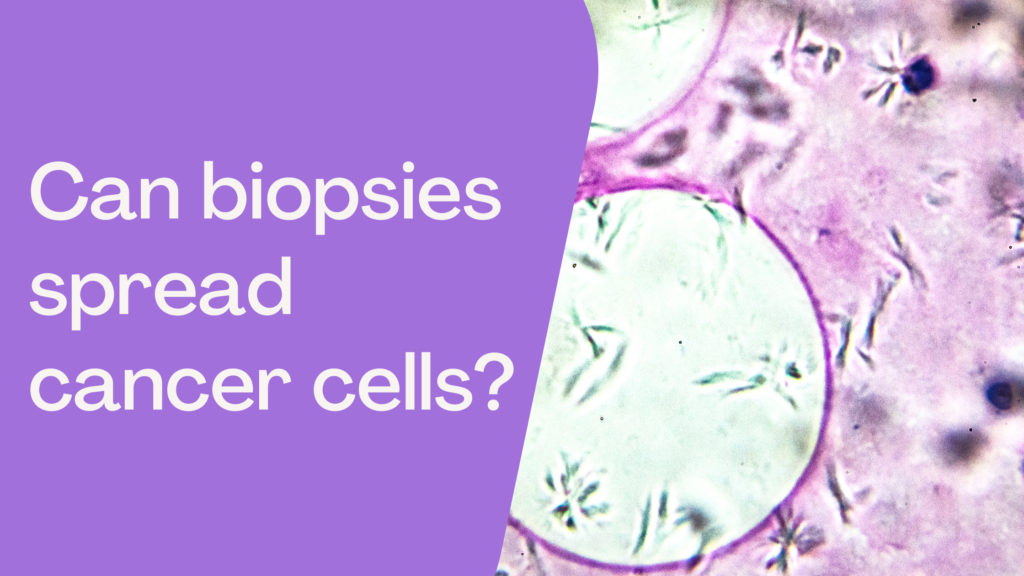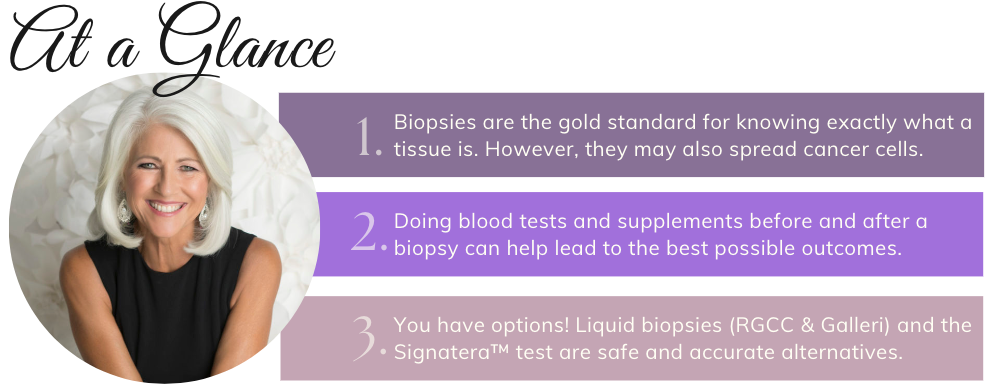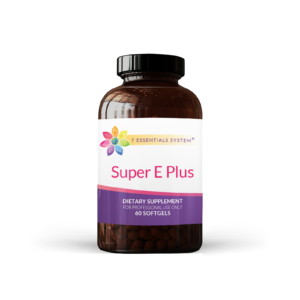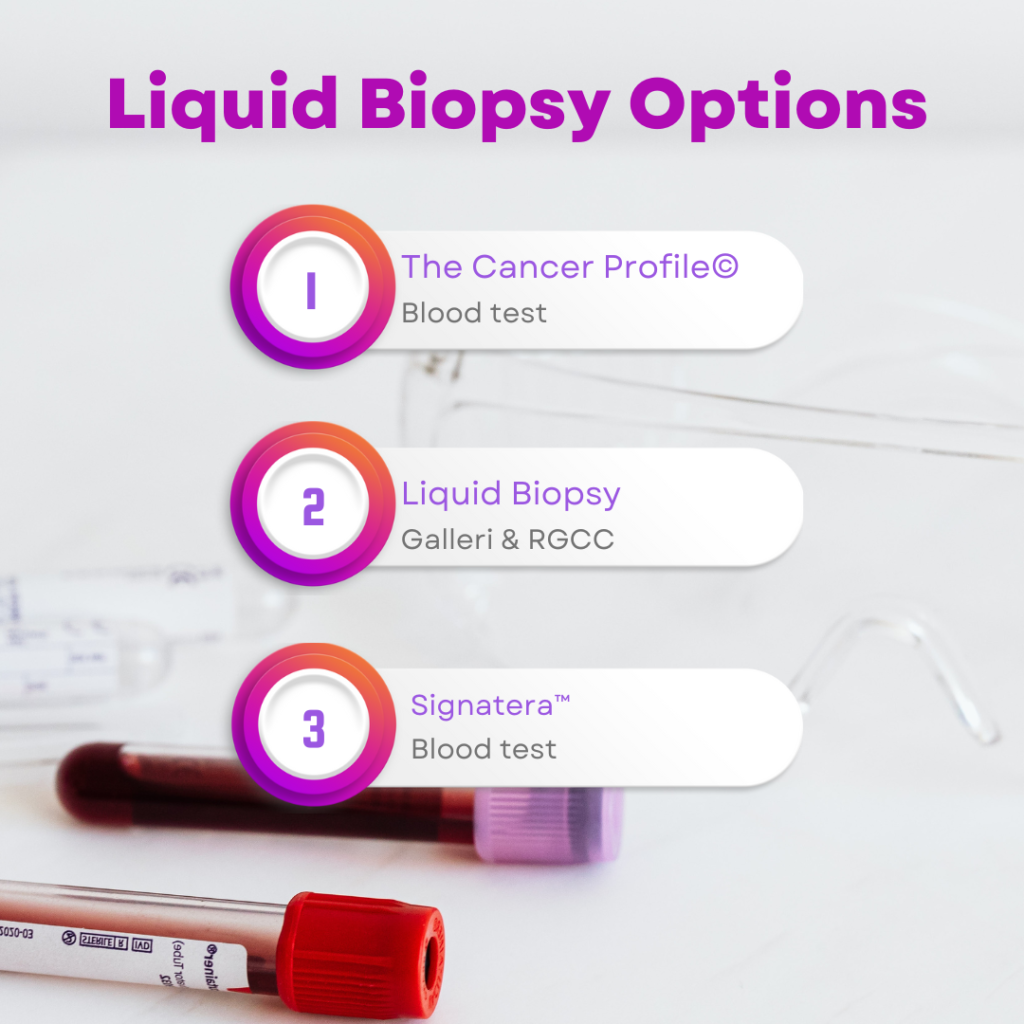

A question commonly asked in the Breast Cancer Conqueror community is, “Should I get a biopsy or a liquid biopsy, and are there any negative side effects?”
My answer: It’s not a simple—yes or no—answer. It’s as complex as your unique needs and beautiful body.
If you don’t want to read the full post, here’s a short explanation: Biopsies are the gold standard for knowing exactly what a specific tissue sample is. Some tissues can look normal on an MRI, mammogram, or ultrasound. For example, an ultrasound may show you have a cyst because it shows a small balloon shape. But the biopsy may prove that it is cancer. The only way to get a true diagnosis of cancer is to have a biopsy. However, needle biopsies may lead to further damage to the cancer cells. These days, you have several options. A liquid biopsy is a safe, non-invasive way to obtain critical information. A liquid biopsy is a simple blood test that does not distribute the cancer cells.
For some women, it is important for them to know exactly what they are dealing with, so they choose a biopsy. Women who prefer not to have a biopsy will choose to check inflammatory markers, cancer markers, ultrasound, MRI, and thermography results in order to get a better understanding of what is happening in their bodies.
It is important to understand that a biopsy breaks the barrier of the tumor wall and releases cancer cells into your system. Therefore, it is wise to exercise caution with biopsies. If it doesn’t change the treatment plan, it may not be worth the procedure’s risks. I personally never had a biopsy because of the potential dangers and the probing and prodding that could disrupt the tumor environment.
Important question: ask your doctor if they will be inserting a titanium chip, which acts as a marker when they perform the biopsy. Many women complain of pain, soreness, and even infection and inflammation as a result of the chip. You have the right to refuse the chip.
Some of the information in this blog post is repurposed from Dr. Connealy’s talk on a previous summit we hosted called Survive & Thrive. Dr. Connealy is the Medical Director of The Center for New Medicine and Cancer Center for Healing. These clinics are the largest integrative medical clinics in North America. Over 67,000 patients have benefited from Dr. Connealy’s support.
If you are curious about reviewing cases where a needle biopsy spreads cancer cells and possibly increases distant metastases, please review these studies:
- Biopsy of Breast Cancer Tumors Increases Distant Metastases in a Mouse Model
- Manipulation of the primary breast tumor and the incidence of sentinel node metastases from invasive breast cancer
- Core-needle biopsy of breast cancer is associated with a higher rate of distant metastases 5 to 15 years after diagnosis than FNA biopsy
- Ki67 increase after core needle biopsy associated with worse disease outcome in HER2-negative breast cancer patients
The basics of a biopsy
A biopsy removes a piece of tissue or a sample of cells from your body for testing in a laboratory. Several types of biopsies include:
- Needle: Used on a suspicious area that can be felt through your skin, such as a lump or enlarged lymph nodes. When combined with an imaging procedure, this biopsy can collect information about cells that can’t be felt through the skin.
- Skin: This type removes cells from the surface of your body.
- Surgical: If the cells in question can’t be accessed with other biopsy procedures, a surgical biopsy may be in order. During this type of biopsy, a surgeon makes an incision in your skin to assess and/or remove the suspicious area of cells. It is a surgery, so you may need to stay the night in the hospital after the procedure.
As for the results, most will be available within a few days, but always ask your doctor about their timeline.
How should I prepare for a biopsy?
If you and your medical team decide that a biopsy is the best course of action, then preparing for it will give you the best outcomes with the fewest side effects. As Dr. Connealy puts it, “You need to be in a victorious cancer-fighting mode!” She first has her patients do comprehensive blood tests that look at electrolytes, liver, kidney, CBC, progesterone levels, etc. For example, higher progesterone levels seem to provide better surgical outcomes. Before and after the biopsy, taking the following supplements may prove to be helpful. 
- Modified Citrus Pectin – This prevents the cancer cells from “sticking” and potentially causing the cancer to spread.
- Super E Plus
- Curcumin
- High dose liposomal Vitamin C
- Melatonin
All of the above are packed with anti-cancer properties that are helpful to take regularly as part of your healthy breast lifestyle. As our world grows more toxic—from chemicals in soil, water, air, food, and beauty products to our lives getting more stressful—we need extra support. Quality supplements can be part of the optimal health-in-a-toxic-world puzzle.
Do I have other options?
YES, you always have other options! There is never only one path forward. Some of the other options that I suggest include:
Liquid Biopsy
A liquid biopsy is a groundbreaking new type of blood test that can detect Circulating tumor cells (CTCs) and Circulating tumor DNA (ctDNA) traveling through your blood. Both provide evidence that you have a cancerous tumor and provide genetic information about the cancer. Companies such as Galleri and RGCC offer tests that can help determine if you are producing cancer cells that can be detected in the blood.
Natera
Signatera™ is a highly sensitive and personalized molecular residual disease assay (MRD). It uses circulating tumor DNA (ctDNA) to help identify relapse earlier than other standard tools. Please click here to learn all about this safe, cutting-edge assessment technology.

When should I do surgery?
First and foremost, since everyone’s situation and diagnosis are unique, this is a question that you and your medical team can only answer. To give you more information about making an informed decision, here is what Dr. Connealy discussed: Yes, sometimes surgery is absolutely necessary—but you need to sign up for everything: herbs, supplements, lifestyle changes, emotional health support, dietary changes, etc. This is exactly what the 7 Essentials System® lifestyle is all about.
In her talk Dr. C gave an example of a 32-year-old woman who may need surgery right away since the cancer could be far more aggressive compared to a 68-year-old woman. She also usually suggests surgery if the tumor is on the large side (5 cm +), but if it is on the smaller side, then maybe strategic lifestyle changes could be a better plan of action. Each healing plan must be as unique as the person herself.
It’s an exciting time to be alive as researchers and scientists are quick to invent new, safer, and more effective testing and treatment options. Keep following this blog and my Wellness Warrior Podcast to stay abreast of the latest research and discoveries!
